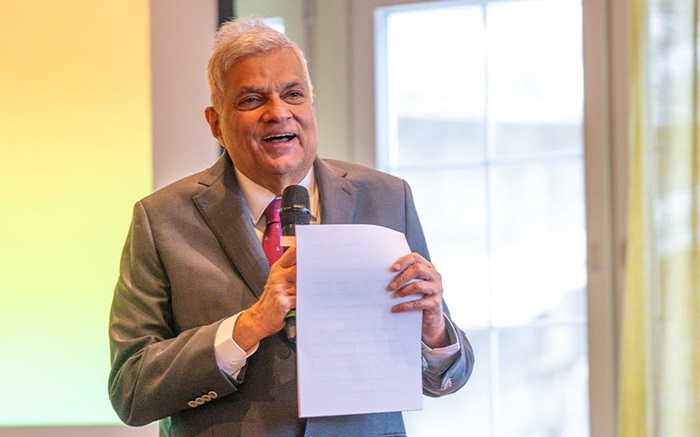
President Ranil Wickremesinghe has highlighted significant strides in Sri Lanka’s economic recovery and outlined future growth prospects, during his official tour to Switzerland to attend the 54th Annual Meeting of the World Economic Forum.
The President provided the brief while addressing the Business Roundtable organized by BOI Sri Lanka and the Swiss-Asian Chamber of Commerce yesterday.
President Wickremesinghe began by acknowledging the challenging times the nation faced, noting the adverse effects of the recent crisis on businesses, small enterprises and the overall population. He mentioned a constructive meeting with the International Monetary Fund (IMF), where it was surprising to learn that Sri Lanka had overperformed despite the difficulties.
One key aspect highlighted by the President was the successful debt restructuring in collaboration with the IMF, emphasizing its necessity for dealing with creditors. He outlined the reforms undertaken in 2022 and 2023, addressing crucial business impediments and resolving supply bottlenecks in fuel and electricity. Additionally, import restrictions were lifted, foreign exchange liquidity was restored and a primary surplus in the balance of payments is anticipated for the first time since 1977.
President Wickremesinghe highlighted positive indicators such as the stabilization of the currency, a significant reduction in inflation, and the reversal of negative economic growth from the third quarter of 2023. The achievement of a primary budget surplus in 2023 marked a notable improvement.
The President went on to discuss the effective progress in debt restructuring, with key creditors agreeing in principle. The IMF’s approval of Sri Lanka’s first program review in December 2023 sets the stage for a shift from stabilization to recovery and growth in 2024.
Looking ahead, President Wickremesinghe emphasized the government’s focus on fostering growth through exports, services and investments, including foreign direct investment (FDI). He announced concluded and upcoming FTAs with Singapore, Thailand, India and China, along with ongoing talks with other South Asian nations. The President highlighted Sri Lanka’s initiatives to join the Regional Comprehensive Economic Partnership (RCEP) and the benefits of GSP Plus for access to European markets.
The address concluded with the President unveiling opportunities for investments in renewable energy, agriculture modernization, tourism, IT and infrastructure development through public-private partnerships. He highlighted forthcoming laws and commissions aimed at enhancing market access, fostering trade and investment and ensuring the competitiveness of Sri Lanka’s economy. President Wickremesinghe reassured foreign investors by mentioning the removal of restrictions and the ongoing commitment to economic reforms.
Meanwhile, sharing his perspective during the roundtable discussion on Sri Lanka’s undertaken reforms, the President’s Senior Advisor on National Security and Presidential Chief of Staff, Sagala Ratnayaka emphasized a comprehensive approach encompassing both economic and governmental facets.
Ratnayaka highlighted that alongside economic reforms, the government embarked on an extensive array of changes. This included a proactive engagement in a diagnostics exercise initiated by the International Monetary Fund (IMF).
Notably, the government did not wait for the completion of the IMF diagnostics exercise but initiated various measures beforehand. Initiatives like the establishment of the Parliamentary Budget Office were implemented even before the governance diagnostics report was published.
Subsequent to these initial steps, a comprehensive program was launched to implement diagnostic reforms. Ratnayaka underscored the significance of introducing critical legislation, such as the anti-corruption law. He explained the process by which the Constitutional Council would recommend commissioners for the Anti-Corruption Commission to the President. Emphasizing a forward-looking approach, Ratnayaka affirmed that all undertaken actions aim to elevate international standards.
The Senior Advisor highlighted the introduction of a substantial number of pieces of legislation on the governance front, with approximately 20 already completed. Looking ahead, the focus includes labour laws, with a target of 40 or 50 new laws and the consolidation of around 40 to 50 existing legislations into a modern, forward-looking framework. The overarching goal is to create a favourable environment for employers and align Sri Lanka with contemporary global standards.
The Business Roundtable provided a platform for Sri Lanka to showcase its economic resilience and commitment to growth, leaving attendees optimistic about the nation’s future prospects.
Representing the Sri Lankan business community at this Business Roundtable were Mr. Krishan Balendra – Chairman John Keels Holdings, Mr. Sanath Manatunge – CEO/MD Commercial Bank PLC, Mr. Dilshan Wirasekara – Chairman Colombo Stock Exchange, Mr. Prakash Schaffter – Deputy Chairman Janashakthi Insurance PLC, Mr. Keith Bernard – Chairman, Sri Lanka Ports Authority, Ms. Stasshani Jayawardena – Joint Deputy Chairman/MD, Aitken Spence PLC, Mr. Sanjeev Gardiner – Chairman Galle Face Group, Mr. Ashok Pathirage – Chairman Sri Lankan Airlines, Mr. Sujeewa Rajapakse – Chairman People’s Bank, Dr. Parakrama Dissanayake – Deputy Chairman & Managing Director, Aitken Spence PLC and Mr. Supun Weerasinghe – CEO Daialog Axiata.
In addition, Mr. Dinesh Weerakkody – Chairman Board of Investment/Chairman Colombo Port City Economic Commission, Mr. Revan Wickramasuriya – Chief Operating Officer Colombo Port City Economic Commission, Mr. Prasanjith Wijayatilake – Executive Director Investment Promotion Board of Investment, Mr. Sagala Ratnayaka – Chief of Staff to the President & NSA, Mr. Deshal De Mel – Advisor to the Finance Minister and Mr. Ruwan Wijewardene – Advisor to the President on Climate Change participated in this roundtable discussion. (NewsWire)


